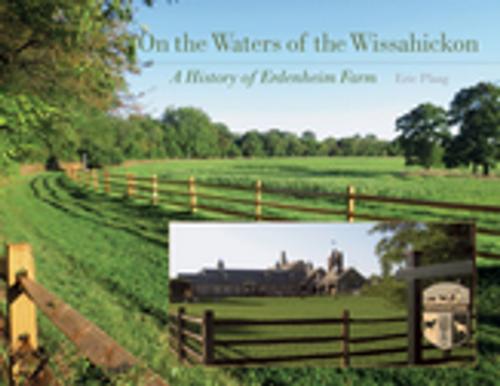On the Waters of the Wissahickon
A History of Erdenheim Farm
Nonfiction, Science & Nature, Nature, Environment, Environmental Conservation & Protection, History, Americas, United States| Author: | Eric Plaag | ISBN: | 9781611175509 |
| Publisher: | University of South Carolina Press | Publication: | October 30, 2015 |
| Imprint: | University of South Carolina Press | Language: | English |
| Author: | Eric Plaag |
| ISBN: | 9781611175509 |
| Publisher: | University of South Carolina Press |
| Publication: | October 30, 2015 |
| Imprint: | University of South Carolina Press |
| Language: | English |
In this comprehensive history of Erdenheim Farm, On the Waters of the Wissahickon separates the facts from the multitude of fictions, revealing the complex and intriguing history behind this important agricultural center along the Wissahickon Creek in Montgomery County, Pennsylvania. Featuring more than one hundred historical and contemporary illustrations and maps, Eric Plaag’s engaging and thorough history of the property chronicles its storied past as well as the inherent value in preserving its future. One of the last intact agricultural parcels in Whitemarsh and Springfield Townships, Erdenheim Farm was at the center of the thoroughbred horseracing world from the 1860s until the late twentieth century. Its illustrious owners have included Aristides Welch, Norman W. Kittson, Robert N. Carson, George D. Widener, Jr., and Fitz Eugene Dixon, Jr., through whom Erdenheim accumulated a rich and fascinating historical pedigree and worldwide attention over the past two centuries. The property is also the subject of extensive lore, including the longstanding rumor that Sirhan Sirhan worked at the farm shortly before his assassination of Robert F. Kennedy, as well as legends that the farm’s guests may have included the Marquis de Lafayette and as many as eight U.S. presidents. Once the home of the Lenni Lenape tribe, who in turn sold the property to William Penn during the seventeenth century, the land that would eventually become Erdenheim Farm passed to German immigrant Johann Georg Hocker and several neighboring farmers by 1763. While the farm’s name is often attributed to Hocker (Erdenheim loosely translating as “earthly home” in German), and Hocker built the farmhouse most closely associated with this name for much of the nineteenth century, the farm’s name probably originates with Dr. James A. McCrea. Under McCrea’s ownership during the 1850s, Erdenheim began building a reputation as a highly regarded livestock farm. Its owner from the 1860s until the 1880s, Aristides Welch, brought national attention to Erdenheim through his purchase of major horseracing champions such as Flora Temple and Leamington, transforming the farm into a significant breeding and training operation that produced dozens of national racing champions over the next several decades. Under its next two owners, Norman W. Kittson and Robert N. Carson, Erdenheim’s reputation declined even as its boundaries dramatically expanded, but, during the twentieth century, owner George D. Widener, Jr., revived Erdenheim’s significance as a world-class thoroughbred operation and livestock showplace. Upon Widener’s death, his nephew Fitz Eugene Dixon, Jr., became Erdenheim’s primary caretaker and began the painstaking process of preserving Erdenheim even as encroaching suburban sprawl threatened its survival. Through a landmark agreement with the Natural Lands Trust, Dixon permanently protected the oldest parts of Erdenheim. Following Dixon’s death in 2006, the Whitemarsh Foundation and nearly a dozen individuals and organizations, including Peter and Bonnie McCausland, worked together to complete a massive land-conservation deal to preserve permanently the majority of Erdenheim’s approximately 450 acres as one of the last remaining open spaces in Montgomery County and a unique example of the Philadelphia region’s agricultural past.
In this comprehensive history of Erdenheim Farm, On the Waters of the Wissahickon separates the facts from the multitude of fictions, revealing the complex and intriguing history behind this important agricultural center along the Wissahickon Creek in Montgomery County, Pennsylvania. Featuring more than one hundred historical and contemporary illustrations and maps, Eric Plaag’s engaging and thorough history of the property chronicles its storied past as well as the inherent value in preserving its future. One of the last intact agricultural parcels in Whitemarsh and Springfield Townships, Erdenheim Farm was at the center of the thoroughbred horseracing world from the 1860s until the late twentieth century. Its illustrious owners have included Aristides Welch, Norman W. Kittson, Robert N. Carson, George D. Widener, Jr., and Fitz Eugene Dixon, Jr., through whom Erdenheim accumulated a rich and fascinating historical pedigree and worldwide attention over the past two centuries. The property is also the subject of extensive lore, including the longstanding rumor that Sirhan Sirhan worked at the farm shortly before his assassination of Robert F. Kennedy, as well as legends that the farm’s guests may have included the Marquis de Lafayette and as many as eight U.S. presidents. Once the home of the Lenni Lenape tribe, who in turn sold the property to William Penn during the seventeenth century, the land that would eventually become Erdenheim Farm passed to German immigrant Johann Georg Hocker and several neighboring farmers by 1763. While the farm’s name is often attributed to Hocker (Erdenheim loosely translating as “earthly home” in German), and Hocker built the farmhouse most closely associated with this name for much of the nineteenth century, the farm’s name probably originates with Dr. James A. McCrea. Under McCrea’s ownership during the 1850s, Erdenheim began building a reputation as a highly regarded livestock farm. Its owner from the 1860s until the 1880s, Aristides Welch, brought national attention to Erdenheim through his purchase of major horseracing champions such as Flora Temple and Leamington, transforming the farm into a significant breeding and training operation that produced dozens of national racing champions over the next several decades. Under its next two owners, Norman W. Kittson and Robert N. Carson, Erdenheim’s reputation declined even as its boundaries dramatically expanded, but, during the twentieth century, owner George D. Widener, Jr., revived Erdenheim’s significance as a world-class thoroughbred operation and livestock showplace. Upon Widener’s death, his nephew Fitz Eugene Dixon, Jr., became Erdenheim’s primary caretaker and began the painstaking process of preserving Erdenheim even as encroaching suburban sprawl threatened its survival. Through a landmark agreement with the Natural Lands Trust, Dixon permanently protected the oldest parts of Erdenheim. Following Dixon’s death in 2006, the Whitemarsh Foundation and nearly a dozen individuals and organizations, including Peter and Bonnie McCausland, worked together to complete a massive land-conservation deal to preserve permanently the majority of Erdenheim’s approximately 450 acres as one of the last remaining open spaces in Montgomery County and a unique example of the Philadelphia region’s agricultural past.















